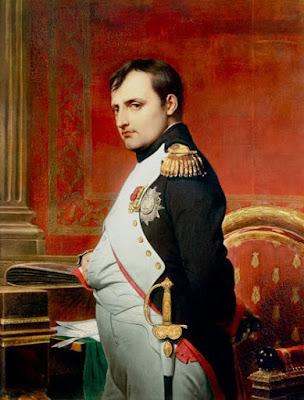Earlier this year, British biographer Andrew Roberts published an enormous and quite readable biography of Napoleon. And in it he wonders if the Battle of Waterloo was really necessary. After returning to France from temporary exile in Elba, Roberts argues that Napoleon had changed. He was now in his mid-forties and beginning to feel his age and the years of hard campaigning, and according to a letter sent to the Allied governments still meeting at the Congress of Vienna, had given up on reconstituting his empire and simply wanted to concentrate on continuing his reforms and modernizations within France. He set about instituting a new constitution which including something approximating a legislature, and started in on further building projects in Paris and reopening several cultural institutions that Louis XVIII had closed during his brief return to the throne.
The Allies, though, would have nothing to do with that, not trusting the word of the man who’d beaten them so soundly so many times. And, Roberts states, they had other reasons for wanting to remove Napoleon—namely, to stop the growth of democratic ideas and ideals that Napoleon had kept as a legacy from the French Revolution, even during his rule as emperor. So they rejected his mild letter in the Vienna Declaration:
"By thus breaking the convention which had established him in the island of Elba, Bonaparte destroys the only legal title on which his existence depended, and by appearing again in France, with projects of confusion and disorder, he has deprived himself of the protection of the law, and has manifested to the universe that there can be neither peace nor truce with him.
The powers consequently declare, that Napoleon Bonaparte has placed himself with out the pale of civil and social relations; and that, as an enemy and disturber of the tranquillity of the world, he has rendered himself liable to public vengeance.”
We’ve had a look at the battle here...and the rest is history. But Andrew Roberts states that history, and European civilization, might have been better off if the battle had never happened and Napoleon had been allowed to rule France. His defeat allowed the old reactionary monarchies who were still living in the early 18th century to hold onto power and crush the nascent movements toward democracy that were sprouting across the continent. The bloody revolutions of the 1840s might not have happened if constitutional monarchies had been adopted...and the world might have been a very different place as a result.
For a fun look at a recreation of today’s Battle of Ligny, check out this article in the New York Times...and if your interest is piqued, I highly recommend Andrew Robert’s Napoleon.






5 comments:
Thanks for this, Marissa; I'm going to put it on the list to suggest to my book group when it's my turn next.
One word of warning, Anne--it weighs in at over 800 pages, not including footnotes and index. It's a BIG book as well as a thoroughly engaging one.
The Georgette Heyer group on Good Reads has been reading and discussing An Infamous Army. I will direct them to this post. The biography sounds interesting. I recently hung out with a French college student and she made it sound like the French regard Napoleon has a hero for his reforms. They still use the civil code he set up. She thought American politics was too strongly tied to religion. Does the biography talk about the French involvement in America at that time? 9i'm reading about the Federalist Era right now). If we didn't have the bloody revolutions of the 1840s, we wouldn't have Les Miserables, which is my all-time favorite musical. I read the book a few times but not word for word.
I didn't know about that group, QNPoohBear--thanks for the heads-up. Yes, the Code Napoleon was a huge improvement over the old laws under the Bourbons (still heavily influenced by the Church) and was taken as a model for much modern law-making throughout Europe. I've not gotten far enough in the book to answer your question about France's interaction with America, but I expect it does--it's pretty darned comprehensive.
And I've suggested it elsewhere, but I can't highly enough recommend Nick Foulkes' "Dancing into Battle: a Social History of the Battle of Waterloo". It might be a more digestible read for your book group, Anne.
Post a Comment